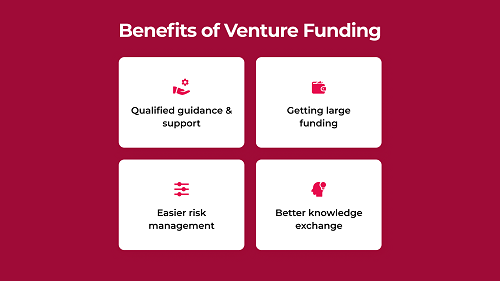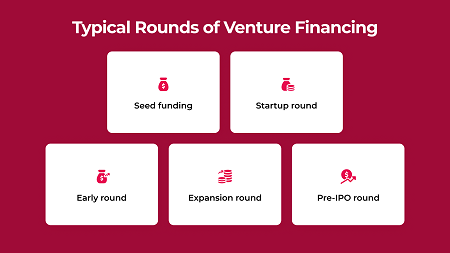All You Should Know About Venture Funding for Startups

Launching technology startup companies, most businesses tend to apply to venture capital funding. It is proved by numerous success stories from modern companies – these companies received substantial cash injections from venture capitalists on their growth.
In this article, we’ll dive deeper into the notion of venture capital funding, its essential benefits for startups (as well as considerable drawbacks), typical steps of VC financing, and many other essentials for startup company owners. So, let’s start studying.
What is venture capital?
Venture capital (or VC in short) is a funding form that distributes the investors’ means to the launched new companies via lending operations. These companies should be high-promising as to the funds’ point of view, but they can easily fail; so, such a way of financing is connected to high risks for the corresponding high rewards.
The operating principles of the venture investment
Not every business tends to be a venture one. Simply put, a particular entrepreneur is investing in, say, a new TikTok and waiting for the project’s rise. If everything is okay, and this new project gains profit, the entrepreneur will increase their investments. In this case, the TikTok-similar app will be called a venture project, and the investor — a venture one, as the project’s success is oriented to the world market, and every new money tranche provides a business exponential growth.
Let’s talk more about the working principles of venture funding from the capitalist’s view. First off, a potential investor looks for a super-successful company that will be well-scalable, sufficiently profitable, and even permit recovery costs. This person invests in, say, five startups during the searching process. Two of them fail in the first year, two of them have an average profit, but one (a so-called Unicorn company) yields a high return on investments.
The main aim of the investor is to find such a company and further assist its founders in further development. However, the more companies they invest in, the higher the success chances will be.
Why do businesses apply to venture funding?
Venture businesses are quite risky projects. Nevertheless, they are popular among entrepreneurs. A reasonable question is why to do so. We’ll give a comprehensive answer below.
To begin with, this type of funding is popular due to its profitability. The media are filled with the stories of startup success after taking venture capital. For instance, the first investment in Google was equal to $100,000, and $150,000 in Apple. Slack and Facebook also obtained venture funding. Instagram, Uber, and Snapchat also started their way to fame and world glory by getting venture funding as startup companies. However, the profit of all these tech giants reaches billions of dollars these days.
As the proverb says, nothing ventured, nothing gained. This can be considered as a motto of venture funding on the whole, and the above-said companies proved it by their own example.
Moreover, the emotional component also plays an essential role in passing through the venture investment rounds. For instance, funding a furniture-woodworking plant gives only profit, whereas investment in companies like SpaceX rewards investors with an income and prominence in the technology world.
Venture investments: benefits and drawbacks
Let’s dig deeper into how the investors can take advantage of the venture funding while developing their startup businesses (digital ones, for instance).

They can obtain qualified guidance and support from many successful startup founders
As a rule, such people quickly become partners in venture funding organizations. Their previous expertise in effective business expansion, decision-making, and problem-solving skills make them irreplaceable and in-demand specialists for those who launch startups.
The startup launchers can get large funding sums through venture investments
Different statistical resources say that it can be amounts from $100,000 to $25 million depending on the maturity of the startup. Furthermore, venture companies are interested in the investment raising process for your startup: that’s why they can refer you to other businesses that can provide you with additional funds.
Venture capital businesses typically hold the right to participate in future rounds of financing and typically contribute more capital as your organization grows.
Venture partners make risk man agement more straightforward
As statistics say, 20% of startups fail in the first year of their existence. However, severe issues of each startup can be avoided or solved more straightforwardly with the assistance of competent experts specialized in venture investments.
More opportunities for knowledge exchange
Launching your own business, you typically have no time to communicate with other entrepreneurs and obtain new knowledge. Venture company investors may spend about 50% of their time establishing their network in order to help the startups they fund. This network may assist you in forming new collaborations, expanding your customer base, hiring key staff, and raising future rounds of finance.
Nevertheless venture funding has significant benefits you should be aware of its drawbacks. This information will help you solve the possible problems.
Funding is expensive and hard to come by
Venture investors prove that for every three or four startup companies they fund, there are about 1000 business concepts. That’s why not every business newbie may obtain venture funding.
Entrepreneurs may lose concentration
Entrepreneurs may lose concentration on their business during the search for investments because fundraising can take a lot of time. As a consequence, they may focus less on startup management issues and more on finding new sources for their startup investment.
Venture capital firms expect your business to expand quicker
Venture capital firms expect your business to expand quicker in order to obtain a return on their investment. When the startup launchers know about this fact, it might add to the already considerable emotional strain that entrepreneurs are under.
We’ve described only some of the essential problems that startup founders face while searching for funding. Technology business plan can be your reliable helper on the way to solve most of the arising issues.
Essential steps of venture funding
Different entrepreneurs look for various ways of investing in their businesses. For instance, family financing, applying to friends for loans, or crowd fundraising are all fundraising options for smaller businesses. Large organizations may apply to angel investors or venture capitalists specializing in financial support for startups. Let’s find out how venture financing is passed.
The Seed funding
The Seed funding round is typically small in contrast to the later funding steps. This sum of money might be used for product development, market research, and/or the management team composition. It passes the following way: applying to venture capitalists for startup company funding, the founders strive to persuade them that their product will be viable on the market. Investors, in their turn, check the tech functionality of the offered product and its economic viability.
The Startup round
The Startup round can be started if the product/service concept looks to deserve further examination or funding. First and foremost, the investors develop a realistic estimate of the amount of money required to advance the enterprise to the next step. Most startups have a demo product accessible at this stage, but they will require funds to continue product development.
The Early round
The Early round typically goes after the seed and startup stages. At this period, the product or service has been produced and is being sold in the market. This is the first opportunity for investors to examine how the product compares to its market competitors.
The Expansion round
The Expansion round means the startup business growth, the product’s distribution, and the firm’s considerable income generated. At this point, the purpose of investment is to scale the firm and increase market share. The venture capital company will then assess whether the management team has achieved the anticipated cost savings and how the business compares against rivals.
The pre-IPO round
The pre-IPO round is usually the final one. The major purpose of this stage is for the company to go public, allowing investors to profit from the enterprise. Funds collected at this stage are often utilized to purchase or merge with other firms, eliminate or prevent other competitors from entering the market, or finance the processes required in an IPO.

Knowing how venture funding methods function and completing all rounds effectively helps investors to profitably make their money back. The startup founders can also benefit from such a knowledge, successfully launching their company and releasing a new and effective product (for example, an IT solution).
Wrapping Up
Venture financing is quite a tricky thing by its definition. Nevertheless, it helps the entrepreneurs obtain funding as soon as possible to become profitable, successful and well-known.
We’ve described for you the basics you should know about venture investments. However, you should know that every startup’s success is measured by how effectively its founders spend the collected money. That is why, before applying for funding to venture capitalists, you should definitely plan each of your steps for a digital startup launch.
In order to properly perform it, you can message an experienced IT provider. The vendor’s specialists will give you a comprehensive consultation as to all the disturbing business questions and help you methodically organize each of your steps on the way to establishing a new company.